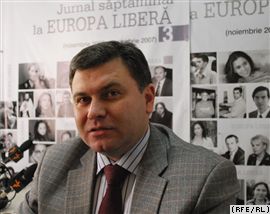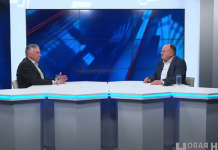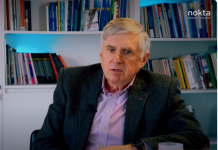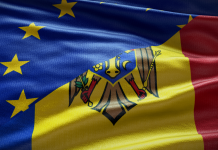Corneliu RUSNAC, moderator Imedia: Good day, dear listeners! I am Corneliu Rusnac and I invite you to a new edition of the broadcast of discussions on topics of foreign policy, produced with the support of the „Foreign Policy Association” and financed by the „Friedrich Ebert” Foundation.
Corneliu RUSNAC: Today we are going to discuss about the negotiations on liberalization of visa regime between Republic of Moldova and the EU which is to be launched on June 15th in Luxembourg within the Republic of Moldova-EU Cooperation Committee. Our guests in the studio are Mr. Iulian Fruntașu, Advisor to the Prime Minister on policy issues and Mr. Victor Chirilă, Executive Director of the Foreign Policy Association. Hello!
Like I said, it is the first round of negotiations on visa regime liberalization. What will be discussed during this round and what does the smooth running of negotiations depend on? Mr. Fruntașu?
Well, it is a complex question; do not know if I could answer within a few minutes, but indeed the Republic of Moldova-EU dialogue on visa liberalization is to be launched on June 15 as well as the first meeting of senior officials within that dialogue, already in Brussels. Moldova, in fact did not wait for the official launch of the dialogue but has taken action, and conducted activities before this period. We can talk later about the actions that have been implemented by the ministries but, again, a sufficient volume of work was done and in some areas we are perhaps comparable with other states like Ukraine and Russia that began this process much earlier than Republic of Moldova.
Corneliu RUSNAC: Nevertheless, what has been done until now?
1.Negotiations on liberalization of visa regime between Republic of Moldova and the EU: achievements and challenges
Iulian FRUNTAȘU, Advisor to the Prime Minister on policy issues: Well, first of all, there is a working group; there is an Action Plan that includes all sorts of activities. Thus, there are several areas such as document security, including biometric matters; I am referring to biometric passports, a chapter on illegal migration, including readmission, a chapter on public order and security and the last chapter on external relations. Under each of these chapters there are a series of activities to be implemented, beginning with the legal framework and ending with technical activities such as procurement of equipment. This would be it, for instance, say biometric passports, given that from 2011 will be issued only biometric passports. Moldova has begun to issue, I do not know how many thousand copies have already been released, and I personally got one. So encourage our radio listeners to do the same. Therefore, there are all sorts of activities. The legal framework, but I mean also technical issues.
Corneliu RUSNAC: Mr. Chirilă, what should Republic of Moldova do so that negotiations with the EU on visa regime liberalization are carried out smoothly?
Victor CHIRILĂ, Executive Director of the Foreign Policy Association: First, government must have a clear action plan, just these days I heard that such a plan exists, an inter-ministerial working group was created, which meets weekly at the Ministry of Foreign Affairs, the Foreign Minister is actually the chairman of this working group. We may say that the process has begun. Government authorities are no longer waiting to receive the green light for visa liberalization, they are not waiting to receive a specific date when that system is going to be liberalized, but they have started the implementation of those criteria stipulated in the roadmaps previously granted by the EU to the countries of the Western Balkans and thus it is hoped that the EU, the European Commission will be determined to give us the same treatment, as the Western Balkan states received.
Corneliu RUSNAC: Can Transnistrian problem be an obstacle to the process of visa liberalization? Mr. Chirilă?
2.Transnistrian problem – an obstacle or not in the process of visa liberalization
Victor CHIRILĂ: I think that it is a problem, because it is a region that is not under the control of the constitutional authorities, the eastern border, on the Transnistrian segment with Ukraine, again, is not controlled by our border guards, and certainly, some questions may occur from the EU regarding this issue. However, I know, for example, that the government addressed EU to find out their position, what actions our country should undertake regarding Transnistria in the context of visa liberalization dialogue. On the one hand, the EU urges us to be as flexible with the region as we can, to engage its authorities in a political dialogue that will lead to a settlement of the conflict, but at the same time, we are forced by the visa regime liberalization process to take some tough measures related to control of migration flows coming from the Transnistrian region, a migration flow that is uncontrolled, to take measures against smuggling of goods, to take measures regarding the security of documents, because there are many Moldovan citizens living in Transnistria and they receive free passports based on documents issued by the Transnistrian authorities, therefore, based on birth certificates issued by the Transnistrian authorities, and in this case the question arises: are these documents secure? What is their level of security? Because people can come from other countries, such as Russia, they may have problems with the justice system in those countries, and by coming to Transnistria and obtaining a fake birth certificate they can also obtain Moldovan documents based on the transnistrian ones, this should be solved and herein the experience of the EU will be helpful.
Corneliu RUSNAC: Mr. Fruntașu?
Iulian FRUNTAȘU: Yes, we have launched an informal process of consultations, I would say. European Commission Delegation as well as those in Brussels know, of course, this relationship, one that is hard enough I think, between liberalization of visa regime on the one hand, and on the other hand, attempts to resolve the Transnistrian conflict. Yes, there is a certain contradiction. I do not know to what extent this will be an obstacle. I think there is a way, and we are currently thinking very actively during all kinds of brainstorming sessions with the Europeans and internally about how to get the best of both worlds. Yes, documents that are issued by the local authorities in the Transnistrian region can not be controlled. Maybe we could involve EUBAM to a certain extent, I do not know how possible is this, but what I mean is that if we were able to close this circle, of entering and leaving the area, we believe that we could control the flow of migration, on one hand. On the other hand, statistically speaking, there has not been observed any trend that would indicate that those coming from the area are committing crimes or violating the current residence regime in the Schengen countries any different from those on the right bank. Thus, statistically speaking, if we refer to past years, we are about equally as good and as bad on the one side. On the other side, both the Ukrainians and the Russians are moving towards a liberalized visa regime. I do not know to what extent the Russians, even those who had breached the law, would be inclined to use Transnistria as bridgehead to enter the EU. Rather it would be people from the states outside the CIS, Pakistan, and Afghanistan who would want to reach the EU, and those people will be quite easy to detect when they come to register for reasons that you are definitely aware of. I believe that we will find a solution eventually.
Victor CHIRILĂ: I think we shall find this solution together with the Ukraine because from this point of view Transnistria is a problem, a potential obstacle to the liberalization of visa regime between EU and Ukraine. Therefore, I think that cooperation is needed to find a common solution among the EU, Ukraine and Republic of Moldova.
Iulian FRUNTAȘU: Yes, I also think that Brussels will actively encourage both Republic of Moldova and Ukraine to find common ground in this respect.
Corneliu RUSNAC: Mr. Fruntașu can we talk now about an approximate timeframe, within which Moldovan citizens could gain the right to visa free travel in the EU?
3.The time frame of obtaining a liberalized visa regime
Iulian FRUNTAȘU: I am not sure if it is right first of all. Expectations are high. I can only say that in the case of Macedonia it took a year and a half. Again, I do not want a time limit that would mean a commitment on our part; I would say a period comparable to that of Macedonia on one hand. On the other hand, an EU visa-free travel, also in the Schengen Member States does not mean that we shall work there, that we shall have the right to work there. There are two different things.
Victor CHIRILĂ: If we compare the start position of Republic of Moldova to the start position of Macedonia, Serbia and Montenegro, which already enjoy a liberalized regime of travel in the EU, we are in a much more advantageous position than they had been, because even though we do not have a roadmap, many things have started to be implemented in Republic of Moldova. Therefore, I believe that this dialogue, as I recently heard EU officials saying, while I was Brussels, that this process will go faster in our case because there are preconditions in this respect, prerequisites și meaning the reforms implemented in our country. Indeed this is a long term process, but if we look at Macedonia, Serbia, Montenegro, we can surely be optimistic that in the next two years, if there is political will to meet those criteria to be identified during the dialogue process, we can hope that the in next two years, in 2013 we shall have this opportunity to travel without visas within the EU. Of course, it also depends on political factors. It also depends on the stability and consistency of governance in Republic of Moldova. Hopefully this year, by the end of this year, we shall successfully overcome the barriers or political tests, such as the referendum and parliamentary elections in November. If, at the end of the year, Republic of Moldova is going to have a stable government, a credible parliament for the next four years, than certainly our chances to visa-free travel to EU until 2013 will be quite high.
Corneliu RUSNAC: What would be the biggest problems facing Chisinau during the negotiations with EU on the liberalization of visa regime in addition to those listed so far? Mr. Chirilă?
4.Difficulties in the negotiation process of a liberalized visa regime
Victor CHIRILĂ: Well, I would not say problems. I would say reform, measures, activities that should be conducted at an accelerated pace, as they say now in Brussels and Chisinau. The problem is as follows. There are some things we need to speed up. Indeed, in 2008 Republic of Moldova started the process of issuing biometric passports, but in two years only about 1400 biometric passports were issued, while, Macedonia, in the first two years, issued more than 400,000 biometric passports, Macedonia, which has a population of about 2 million people. I think this example could serve as a direction to us, where we should go and what should be the pace of issuing biometric passports in the next period, the following year. In addition, there is the integrated system. We do not have an integrated border control system, border management. Again, we have neither a strategy nor an action plan. There is already the willingness to be assisted in this by Frontex, the European Agency for the Schengen border control, and also by the EUBAM. Therefore, probably during the next months we are going to have the strategy and the action plan and this system will be implemented in 2011 with the EU financial assistance.
Iulian FRUNTAȘU: Yes, this question is in the plan, in the chapter on illegal migration and including readmission, to develop a national strategy with respect to the integrated border management, create a National Council regarding the integrated border management. There are several amendments and laws that are being developed and in the process of being adopted. It is true that the political process as is it. Parliament, as you know, does not meet in sessions, and there are not so many to vote these amendments. But once we have a functioning parliament, I believe we will accelerate the process. It is true that we still work hard and are currently trying to promote amendments, laws and projects through the Alliance, all components are sensitized and when they manage to meet in session these laws have priority. Moreover, there are all sorts of activities. I can enumerate them. If, for example, we refer to the section that I mentioned, illegal migration including readmission, Frontex been mentioned, the course on detection of forged documents and stolen vehicles was introduced in the curriculum of the Border Guards College, which is an important issue as well. Also, amending the Law on labor migration, which intends primarily to simplify the procedure for documentation of foreigners who come to Republic of Moldova. It is a 2008 law. There are all sorts of actions. A labor market was conducted, for example, in Italy for Moldovans who are staying there so that they can start a business in Moldova. It was held in Padova on May 8th. There are activities being conducted in respect to the signing of social security Agreements with Romania, Italy and other countries. There are a number of measures in different areas which I believe I should not enumerate at the moment. People are working. There is a working group that operates in spite of difficulties, I mentioned, the current political situation.
Corneliu RUSNAC: In addition to negotiations on visa liberalization Republic of Moldova should also start negotiations on Free Trade Agreement with the EU. How long could it take before the start of negotiations on this agreement and what does it depend on? Mr. Fruntașu?
5.Negotiating Free Trade Agreement with EU
Iulian FRUNTAȘU: I do not think there are any political obstacles. I do not know, to be honest with you. I think that depends on our will, first of all, and it also depends on how we know to promote our national interests, because Ukraine has been negotiating this Agreement for two years now. It also depends on the priorities of the Republic of Moldovas government. We expect some pretty serious and substantial negotiations.
Corneliu RUSNAC: Mr. Chirilă?
Victor CHIRILĂ: We have been recently visited by a delegation of the European Commission to report on Republic of Moldova’s preparedness to start such consultations, negotiations with the EU. Okay, now follows the period of analysis of these results in Brussels, and probably it may be expected to receive a response in the second half of the year. Judging by the statements of European officials, it seems that chances are high that such a decision would be positive for Republic of Moldova. Certainly, this does not mean that in a few months this agreement will be negotiated. On the contrary, I think it will be more difficult to negotiate than the Association Agreement itself, part of which is also this Agreement on establishing a deep and comprehensive Free Trade Area. This agreement will require some commitments that will mean financial resources and Moldovan companies do not always have such financial resources and therefore the implementation of those commitments, technical standards should provide a period of reprieve for our country. And this reprieve will have to be negotiated with European officials.
Iulian FRUNTAȘU: And during that period, each industry will have to come up with proposals. I think this will be the biggest difficulties, because in my opinion the Agreement itself is two-sided. On the one hand, yes it is true that there is this time period. The previous agreement, regarding autonomous preferences, it was somehow "more favorable" in the sense that we could protect our industries but, on the other hand there is no such pressure that is needed to reform the sector and that can only be ensured by a Dee and Comprehensive Free Trade Agreement with the EU. We must find a balance so as to encourage our industry to reform, but not to destroy it. It is a balance that our negotiators should know very well and reach a good agreement for the country.
Victor CHIRILĂ: Autonomous Trade Preferences, indeed create a favorable asymmetric trade regime, due to the fact that we can export many products without duties, even some that we do not currently produce, but the EU continues to pay certain fees to export the same products into our country. But this asymmetric trade regime in the form of Autonomous Trade Preferences, for example, does not provide for liberalization or free movement of investments, which are necessary to implement the European standards. Yet this Deep and Comprehensive Free Trade Agreement with the EU will provide for the opportunity to export without restriction investments in Republic of Moldova, will allow free movement of services in the Moldovan market and that of the EU. Namely the free flow of investment, free movement of services are those vehicles that will bring the required standards, assistance and practices necessary to comply with those of the EU.
Corneliu RUSNAC: We know that negotiations with the EU on another agreement, the Association Agreement began a long time ago and its third round of talks have ended recently. What conclusions can we draw now regarding the process of negotiations on the Association Agreement? Mr. Fruntasu?
6.The results of the negotiation process on the Association Agreement
Iulian FRUNTAȘU: I believe that negotiations are conducted at a normal pace, maybe even quite quickly, I would say, given what the government is doing. There exists political will and capacity within the Foreign Ministry, and within other ministries. Another problem, to my mind, is: to what extent we can … this agreement, how should I say, the respective agreement does not stipulate a political approach with the EU. It is an Association Agreement which relates to the Eastern Partnership and it is a good document and an important one, nobody doubts that, but Turkey is an associate member and I do not know if it is ever going to become a member of the EU, whereas we have other ambitions. And these are ambitious that we may not declare very clearly at the moment, so that it does not scare the people from Brussels, but I think many people realize this, particularly in the European Parliament that Republic of Moldova is well set to work and indeed wants to join the EU within a specific perspective. How to obtain certain promises and how to place them in certain documents, I do not think that is possible within this agreement, maybe in the context of other documents but it is important for us to be approaching the EU both in legal and political terms, so that Brussels or other Member States could no longer, not only Brussels, because it is not just at the Commission where everything is resolved, if it were the Commissions will we would already be in the EU but, there are more Member States, of which some are reluctant, unfortunately. Our diplomacy must be very active in those capitals and possibly, if they implement a very complex program, it might already be the case for active diplomacy after the next elections, if we are going to have a more solid mandate from the Moldovan population, then I think we shall advance much more along the path of political integration into the EU.
Corneliu RUSNAC: Mr. Chirilă?
Victor CHIRILĂ: I do not make a tragedy out of the fact that Republic of Moldova does not yet have this political perspective. Republic of Moldova is not ready to get this political perspective. Of course, it would have been very good to get this promise because we saw that in the case of Romania, Bulgaria, and Central European states this perspective was a kind of motivation, an incentive for reform, to accelerate the pace of coming closer towards the EU, to determine the political parties to focus more on western vector, to find common ground in terms of foreign and domestic policy. It was a unifying factor for the elites in these countries. At the same time, this agreement offers us the prospect of economic integration in the EU; furthermore it allows us to benefit from the structural assistance mechanisms that are currently available only to EU Member States. This economic integration will certainly speed up political integration; in fact, it will assist our political integration without a clear perspective in this regard. If Moldova perseveres and continues on this trend in the coming years, we are surely going to receive this clear promise of EU membership. We must also be realistic. Regional political situation is not favorable to us. Now, there is also the financial and economic crisis, which makes the EU, EU Member States to be not only affected by the enlargement fatigue, but also by financial crisis fatigue. We should understand their reluctance, their concerns. Therefore, we must be diligent in implementing domestic reforms and also strengthen our bilateral relations with such EU engine states, as Germany, and the current Government does is quite extraordinary, it is actually an investment in our future EU membership, because the increasing involvement of Germany in our internal problems, such as Transnistria and reform process is, I think, a guarantor of the fact that we shall get the political perspective of EU integration as well.
Corneliu RUSNAC: Unfortunately, the time reserved for our program has expired. I thank you very much for your presence in this show. Dear listeners, I remind you that you have listened to a broadcast of discussions on issues of foreign policy conducted with the support of the Foreign Policy Association and funded by the Friedrich Ebert Foundation. See you soon!







